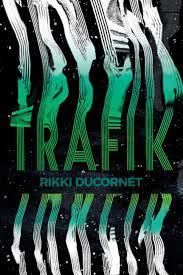by Nicole Yurcaba

Coffee House Press has long been a publisher where artists and audiences interact. They are notorious–in the best way–for publishing the best in experimental literature that otherwise would not find a publishing opportunity and eventually an audience. Thus, it’s no surprise that Coffee House Press would bring to the literary world a title like Rikki Ducornet’s Trafik. Trafik is a condensed powerhouse in which readers glimpse a space-age future where the mostly-human Quiver and her best-friend-of-a-bot Mic travel asteroid to asteroid, harvesting minerals. As they travel the universe, Quiver and Mic also revel in and long for a long-gone Earth they never actually experienced. Their adventures not only take them to the universe’s far reaches, but also help them embark on inspirational paths of self-realization. A svelte, poetic novella of 112 pages, Trafik is a philosophical fireball exploring passion, loss, and identity.
Initially, readers may notice the linguistic play inherent in Trafik. For example, instead of eyes, Mic has “lenticulars” which “are punctuated with dots.” The characters refer to the catastrophes which dramatically reshaped the universe as “The Burnout, The Washout, The Scouring, The Scaling, The Noise, and, lastly, The Scattering.” Mic refers to a mouth as a “word hole.” These linguistic twists solidify the novella’s futuristic tone and setting. They also pose the concept that in a post-apocalyptic universe devoid of an Earth to inhabit, language has also changed. In regards to the past, language reduces to its most basic, which may not come as a surprise given the future in which Quiver and Mic dwell is also a future devoid of books. With its implicit commentary on the (lack of) linguistics and books, Trafik echoes the sentiments of past, popular dystopian works like Earth Abides.
Nonetheless, Trafik spares readers the doom-and-gloom exhibited by the majority of contemporary dystopian fiction. If anything, Trafik is a novel about discovering one’s passions and reshaping one’s purpose. Of any of the characters, Quiver most represents this philosophical transformation. In the chapter “Between,” Quiver reflects, “Sometimes I wonder if my excursions into space are not simply an excuse for leaping off of a cliff.” At this point, Quiver figuratively stands at an existential crossroads: “She thinks she will always be in this hallway, its blind doors and filthy windows of bubbled glass.” In “Luster,” Quiver experiences a moment of self-awareness. She questions, “What is it all about? What am I about?” She supposes she is about her longing “for a lover and for a home.” Quiver recognizes her humanity, a recognition which starkly contrasts Mic’s existence as a bot.
Trafik is also a novel about hope and about finding a place to exist and thrive–even if that place isn’t the one in which an individual initially thought they could exist or thrive. Mic and Quiver decide to “go rogue” and venture to Trafik. Trafik is where Mic rides the shoulders “of a strapping and trending astroanthropologist.” It is where Mic’s hero, Al Pacino–a “figment from a world long vanished,” wanders freely, “sporting a marvelous Italian suit the color of grass.” Trafik is a place of individual freedom and expression, a place where “it did not seem to matter where you came from, what epoch you belonged to.” Trafik so entices Mic that he decides to stay, forfeiting all future adventures with Quiver. However, Trafik also holds a few surprises for Quiver.
Mic and Quiver’s madcap journey reads like Pink Floyd’s 1967 album Piper at the Gates of Dawn meets 2001: A Space Odyssey. Instead of a manipulative, malicious Hal readers meet the quirky, 1950s-obsessed Mic. With its discussion of humanity and what makes an entity human, Trafik pairs well with books like Olga Ravn’s The Employees. With its exploration of queerness, acceptance, and tolerance, it gives readers hope that they, too, will find their Trafik and asks them to consider what they may regret losing if they don’t fully embrace the moment, the time, and the place should they disappear.
Nicole Yurcaba (Ukrainian: Нікола Юрцаба–Nikola Yurtsaba) is a Ukrainian (Hutsul/Lemko) American poet and essayist. Her poems and essays have appeared in The Atlanta Review, The Lindenwood Review, Whiskey Island, Raven Chronicles, West Trade Review, Appalachian Heritage, North of Oxford, and many other online and print journals. Nicole teaches poetry workshops for Southern New Hampshire University and is a guest book reviewer for Sage Cigarettes, Tupelo Quarterly, Colorado Review, and The Southern Review of Books.



Add your first comment to this post